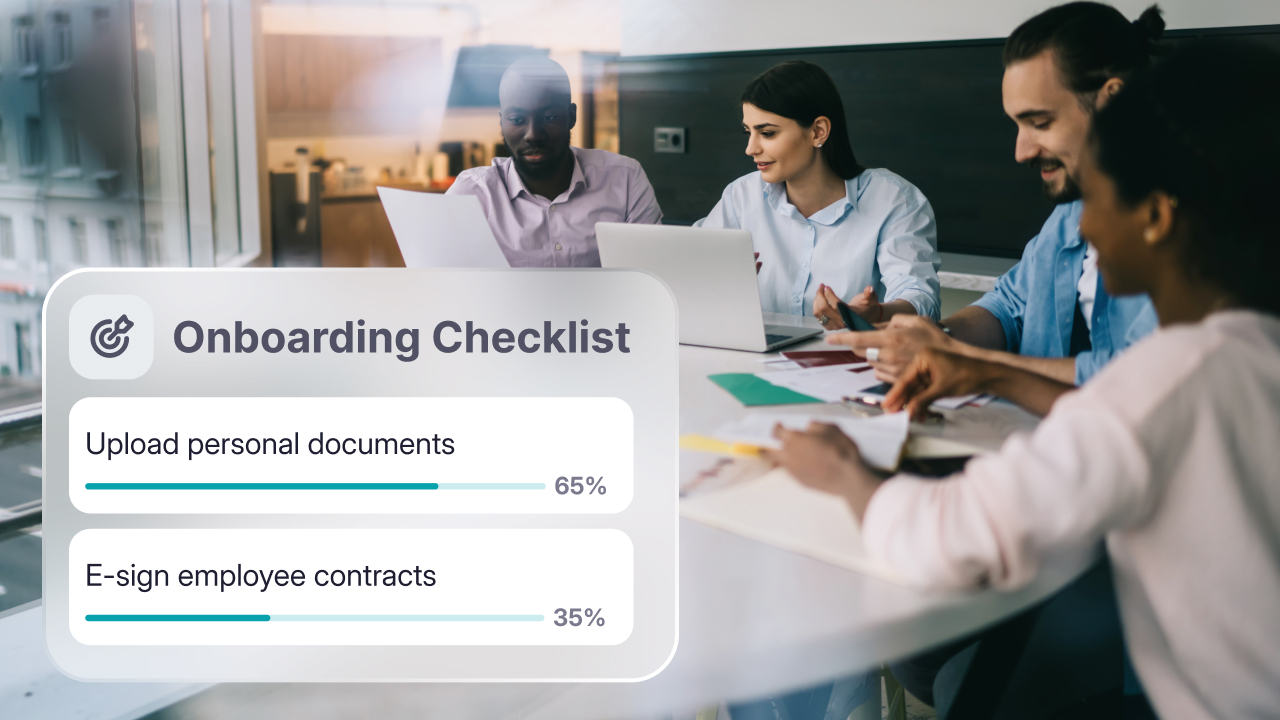When an employee leaves, it can be easy to think that you just need to file their resignation letter, do the paperwork to get their P45 issued, and say goodbye to them. But it’s best practice to have an offboarding process, and an exit interview should be part of it.
In this guide, we’ll go through what an exit interview is, why they’re important and the best practices to ensure you get the most out of your exit interviews. We’ll also share some example exit interview questions so you can start to build your own offboarding structure.
Let’s dive straight in.
[hubspot_cta id=a0939a4b-706d-4d4c-8a0e-d1f909e82502 alt=”return-to-work-interview-template” width=”100%” height=”100%”]
What Are Exit Interviews?
An exit interview is simply an interview that you conduct with a departing team member to get an understanding of what your company can do to improve, and therefore increase employee retention. Think of it as the opposite of a job interview! It’s an opportunity to ask the exiting employee why they’re leaving, what their impressions are of management and your organisation as a whole, and whether they have any suggestions for improvements.
Exit interviews are also the last contact you’ll have with the departing team member. If you leave the exit interview on a positive note, they’re more likely to have a good impression of your organisation, and may even return to work for you in the future.
Why Are Exit Interviews Important?
There are three key reasons why exit interviews are important:
Reveals cultural issues
Leaving employees are usually more willing to discuss cultural issues as they don’t have to worry about it impacting their progression anymore. Conducting exit interviews can help you to gain insight into your management team’s leadership styles and the overall culture, helping you to identify any problems before they get too big.
Maintains a strong employer brand
An exit interview is your last chance to make a positive impression on your departing employee. Giving exiting employees a chance to voice their opinions and offer constructive feedback shows that you can accept criticism and are willing to improve.
These departing employees will remember you in a more positive light, and may even become boomerang employees – where someone returns to their old company within a short space of time. In fact, since the pandemic, 28% of all external hires are boomerangs who had previously resigned within the last 36 months.
Improves retention
It may seem odd, but conducting exit interviews can improve employee retention rates. When other employees see that you’re holding exit interviews and showing a genuine interest in implementing the feedback that you receive, it helps to build a positive company culture, where teams know that you care about improving their work environment.
Research by Aberdeen found that organisations with an offboarding process (which the exit interview is a part of) retain 71% of their employees, as opposed to 57% in organisations without an exit interview process.
Who Should Conduct Exit Interviews?
It’s usually best to have someone in the human resources team conduct exit interviews. If you’re a small business that doesn’t have a dedicated HR team, make sure that it’s a neutral person that hasn’t had direct involvement with the leaving employee.
This ensures that the departing individual can speak freely about any issues they may have had with management. It’s unlikely that you’ll get honest feedback from someone that’s sitting in front of their line manager.

Exit Interview Best Practices
There are some best practices that you should follow to ensure you get valuable information from an employee exit interview, but also to make sure that you have important conversations that will help you learn where to improve your business and retain top talent. Here are our tips for conducting great exit interviews:
Have a loose structure
If you have no structure to your exit interview, you’ll find it difficult to consolidate information and use the data going forward. However, have a structure that’s too strict and you won’t leave room to gain insights that might not flow naturally from following a set of questions. It might also come across like the exit interview is just another tick-box exercise and that you won’t actually take action on any of the feedback you get.
The insights you gain from having an open and honest conversation with your departing team member could be much more valuable than those you get from your set questions. Make sure you have structured questions, but also allow time for the employee to speak freely to allow for unanticipated responses. These could be your most important conversations.
Communicate the purpose straight away
Let your departing team member know what they should expect from the exit interview. Tell them what they and the business should get out of it, and ensure that they know that they can give honest feedback about their manager, the company culture and their working conditions.
However, it’s important that they know that the exit interview shouldn’t be used as a way to spread gossip about colleagues. The exit interview process should be a constructive, two-way conversation between employer and employee.
Send questions in advance
It’s a good idea to send your exit interview questions in advance to your departing team member. It’s not uncommon for individuals to feel worried about what they’ll be asked in an exit interview, so sending them in advance can help put their minds at ease.
Giving your employee a chance to think about their answers before they meet with you means that you’ll get better participation and engagement.
Make it a positive experience
Your departing employee shouldn’t dread an exit interview. You should foster a positive relationship with all team members during the time that they work for your business, so they know that if they decide to leave their current position, they can have a constructive conversation with you about how your business can improve.
Make sure that you don’t make your employee feel guilty for leaving during the interview, and definitely don’t use it as a last-ditch attempt to get them to reconsider. Just try to create a casual environment and do what you can to make the individual feel comfortable.
Listen

It’s important that your departing employees feel heard during exit interviews. Make sure you listen; don’t talk too much and allow your team member to answer questions freely and honestly.
Body language is important. Make eye contact and be aware of your posture – don’t cross your arms. It’s also a good idea to take short, quick notes by hand (if you can) rather than using your laptop. If you’re hiding behind the screen, it will seem like you’re not listening or taking the interview seriously. You can always perfect your notes later.
Implement feedback
It’s easy for employers to hold an exit interview and then forget about all the constructive feedback they receive. Current employees will soon see past that if nothing changes, and that can seriously affect employee engagement and retention rates. Unfortunately, just 28% of HR managers act on exit interview data. Make sure your business works to increase this percentage!
Make sure you actually take feedback on board and look to make the appropriate improvements as part of your company strategy. As we mentioned before, you could notice a reduction in staff turnover since your current employees will see that you take your exit interview process seriously.
After the meeting, share the feedback with the departing individual’s line manager. You might find our guide on providing effective performance feedback useful if there are some tricky issues to discuss.
Remote Exit Interviews

We’d always recommend holding an employee exit interview face-to-face if possible, as you’ll be able to read each other’s body language and it’ll help the conversation flow more naturally. But with more and more businesses going 100% remote, we know that’s not always feasible.
If you do have to hold an exit interview remotely, make sure you follow all our best practices above and hold your interview over video call so you and the departing team member can see each other’s faces. You might not get as much honest feedback and ‘off-question’ responses, but it’ll still be good enough to ensure your employee feels heard and to get enough insight on what your business could do better.
Example Exit Interview Questions
As we said earlier, it’s best to have a loose structure for your exit interviews to allow for open, unanticipated feedback, but you should also have a set of questions prepared so you can compare data between departments and track your retention progress over time.
Ask questions about the employee’s reason for leaving, questions related to their job role and also ask for their personal experience of the company.
You should aim for around 5-10 questions for an exit interview. Here are a few example questions to get you started:
Personal questions
- What are your reasons for leaving?
- What were some of the biggest factors that led you to accept this new position?
- What does your new position offer that is more attractive than your current position?
- How long ago did you start to feel like you wanted to search for a new job?
- What would have had to change for you to stay?
Job questions
- Did your original job interview for the role set up the right expectations?
- Did you feel like you had the tools and support to do your job well?
- Did you feel like your manager wanted you to succeed?
- What was your relationship like with your manager?
- Do you believe that you were fairly compensated in this position?
- What did you like most about your job?
- What did you like least about your job?
- Did you feel like there were enough development opportunities?
- What skills are the most important to excel at your job?
- If you were hiring your own replacement, what would you look for in future candidates?
Company culture questions
- What are some positive and negative experiences you’ve had during your time at the company?
- Overall, were you happy with the benefits offered at our company?
- Did you feel valued and recognised at the company?
- How would you describe our company culture?
- What would you change to make this company a better place to work?
- Would you ever consider working for this company again in the future?
- On a scale of 1-10, how likely would you be to recommend a friend to work at this company?
- What are the toughest challenges you foresee for our company in the near or long-term future?


